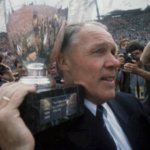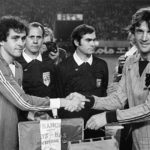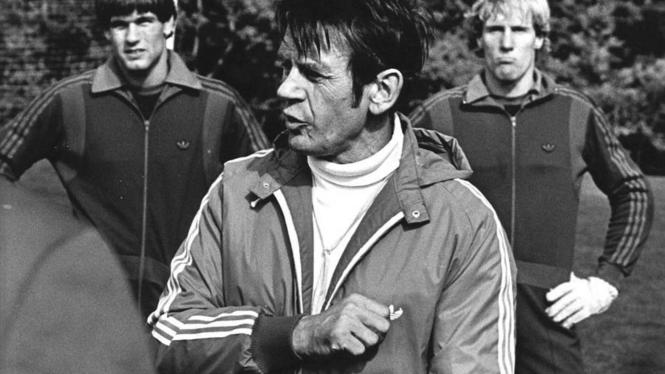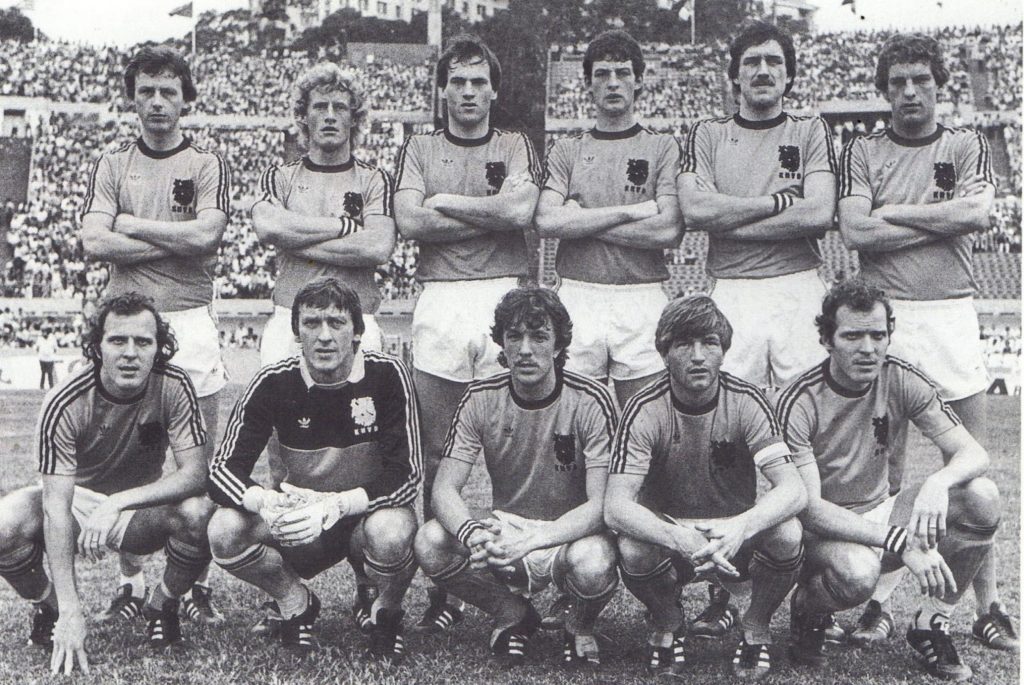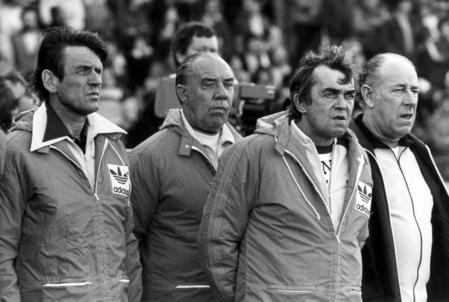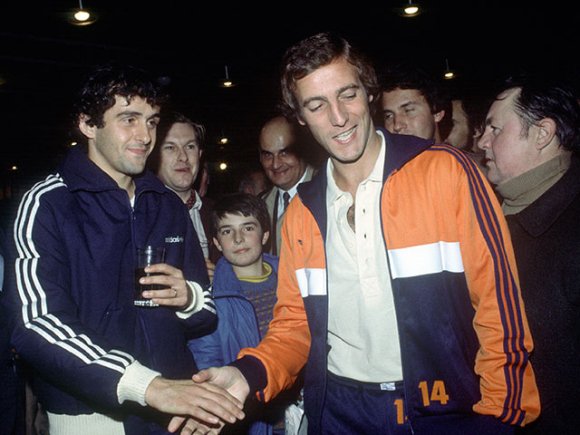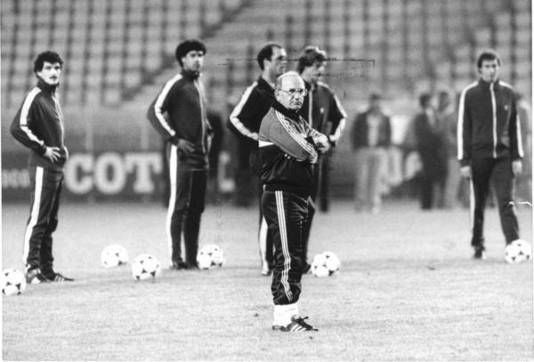As requested by some, a look at the different National Team coaches the Dutch enjoyed over the years.
I am giving you my personal opinion. You can add yours below :-).
World Cup 1974 – Rinus Michels
Rinus Michels already made a name for himself with Ajax and Barcelona and was considered a European top coach. The Dutch barely qualified for the tournament under Cech coach Fadrhonc, who had a career previously in Holland as coach of mid-tier clubs (as we discussed many times: the NT wasn’t considered that important in those early days). He originally was a fysio but managed a team in the Czechoslovakian competition to a win and after fleeing to the west, became head coach. And pretty successful too, in Holland. But the Dutch federation found him to weak to manage the team of big personalities (Cruyff, Van Hanegem, Krol, Keizer, Israel, Jansen) and decided to bring in a “supervisor” to manage the whole WC process in West Germany: Rinus Michels, who at that stage was coach at Barcelona.
Michels – a former limited Ajax defender – was a stickler for discipline but tactically limited. The Total Football tactics he was credited with, was actually developed by Ernst Happel at Feyenoord and implemented in the Dutch squad in 1974 by Cruyff, Van Hanegem and Wim Jansen. The team had an amazing impact on football, moving forward, but Michels was not as instrumental as people back then though, and as Michels himself would let on.
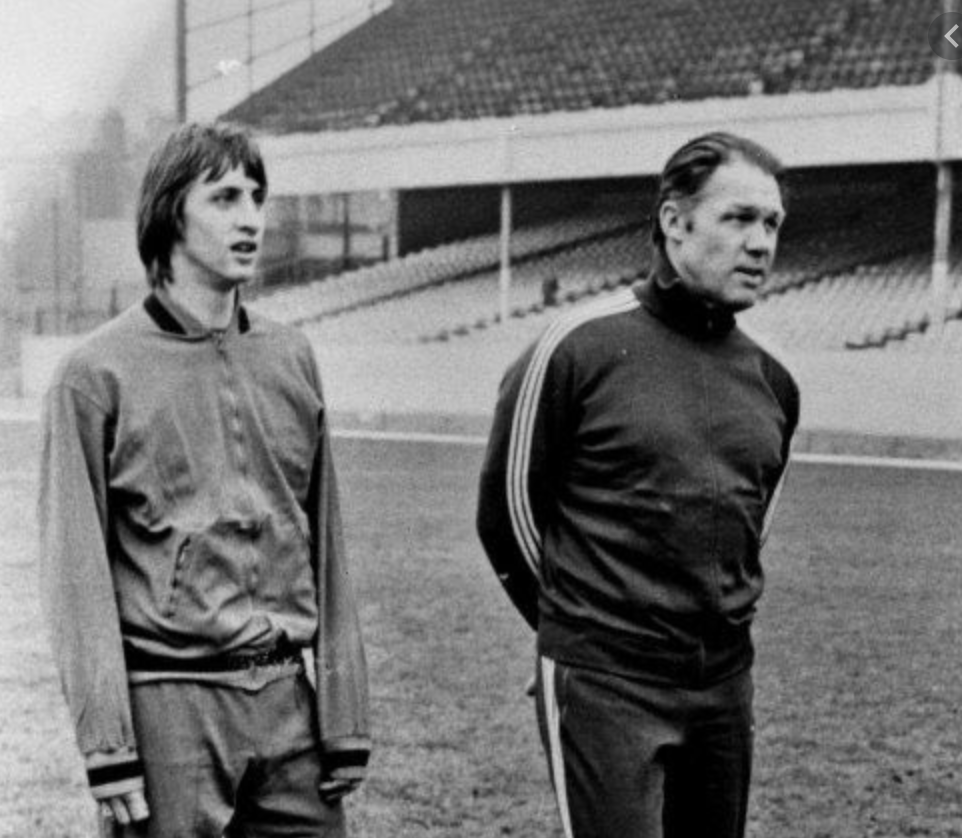
He returned to Ajax for a spell, then back to Barcelona for 2 seasons before embarking on an adventure to the US (LA Aztecs). He had some lesser successful attempts in the Bundesliga before returning to the Dutch FA where he would win the Euros in 1988 and reach the semis in the 1992 Euros.
He famously clashed with Johan Cruyff, Van Basten and Ruud Gullit, amongst others and was considered to be a prickly character. Stories abound how he blocked the appointment of Cruyff as NT manager many times in his role as Federation bonzo and he clashed with Gullit in 1990, when the players were forbidden to talk to the media, while Michels had a “tell-all” column in the Dutch media, undermining the team process. Gullit was the squad’s mouthpiece in a scathing response via competitive media. In 1988, Michels initially ignored Van Basten and had to make an about-face after losing his first tournament match vs the USSR.
As an NT coach, despite the WC1974 silver and 1988 gold medal, I don’t rate him high. The players were instrumental in the performances (Cruyff in 1974, Van Basten in 1988) no matter who sat on the bench.
European Championships 1976 – George Knobel
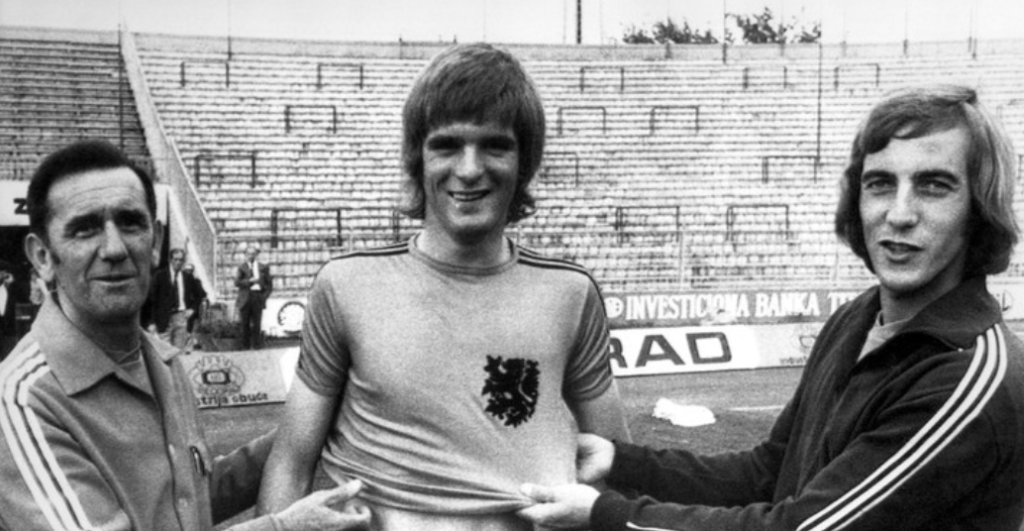
A sad story for a highly respected coach. The Dutch were not mentally ready for this tournament. All the big guns were present (Cruyff, Neeskens, Rep, Rensenbrink, Van Hanegem, Krol) but the first game ended with two red cards for Neeskens and Van Hanegem, and Oranje lost dramatically. In the Third Place play off, Knobel used a number of new names trying to re-invigorate the team (Jan Peters, Peter Arntz, Ruud Geels, Adrie van Kraay) which got us bronze, beating Yugoslavia after extra time.
Knobel will always be linked to MVV Maastricht where he had his most succcesses. He also managed Ajax for a brief spell. A footnote in Dutch football history.
World Cup 1978 – Ernst Happel
Where Michels was considered a “hollow barrel” making a lot of noise, but lacking substance, Happel was the complete opposite. A quiet man, no using much words at all but tactically very astute. The Austrian had a tremendous career as a player ( Rapid Wien, RC Paris, Austrian NT) before becoming a coach at Den Haag and then Feyenoord where he won the European Cup with players like Moulijn, Van Hanegem, Jansen and Kindvall. He moved on to Sevilla and Club Brugge before being asked to manage the NT to the 1978 Argentina World Cup.

He was an introvert. Didn’t like talking to the press and spent most of his time playing cards. He was a chain smoker – like many players back then – and usually only had one sentence before a game: “Gentlemen, a win please!”. When Van Hanegem once approached him for a tactical conversation, he famously said (in his Dutch/German make believe language) “Kein geloel, Willem. Fussballen!”. Which translates as: “Cut the crap, Willem. Just play football.”
He didn’t do much in terms of tactical talks but he simply picked the right eleven and gave them the freedom to play. The respect he got from his players was partly due to his gifted skills. He would demonstrate that by placing ten balls outside of the box and hitting the cross bar every time with his shots… He famously had to tell his protege and close friend Van Hanegem that he didn’t have any use for him in the 1978 WC squad, which left De Kromme in tears on national tv. With a team lacking Cruyff and Van Hanegem but with young upstarts like Arie Haan, Piet Wildschut and Ernie Brandts, Happel reached the finals and if Rensenbrink was a tad more fortunate would have won gold in 1978.
As a coach, I rate him very high (check his CV, he won 26 trophies as a coach!!!) albeit a tad old-school for today’s game….
European Championship 1980 – Jan Zwartkruis
Former assistant to Ernst Happel at the World Cup in Argentina, Zwartkruis made a name for himself as coach of the Military Team (yes, you read it correctly). That team ended up to be a great feeder team for the National Team (yes you read it correctly, again!). Rob Rensenbrink, Jan Mulder, Jan van Beveren, Barry Hulshoff, they all played for the Military Team during their draft period and played at the the Military World Cup (wow). Which was held in Iraq (double wow). Zwartkruis was supposed to be the NT coach at the WC 1978 but a conflict with his employer (the Ministry of Defence) he wasn’t able to take the reigns (enter Happel). This was resolved after the World Cup and the amicable Zwartkruis – who was great with young talent – was given the main job for the Euros in 1980 in Italy. Again, a very short tournament this time, with only 8 nations.
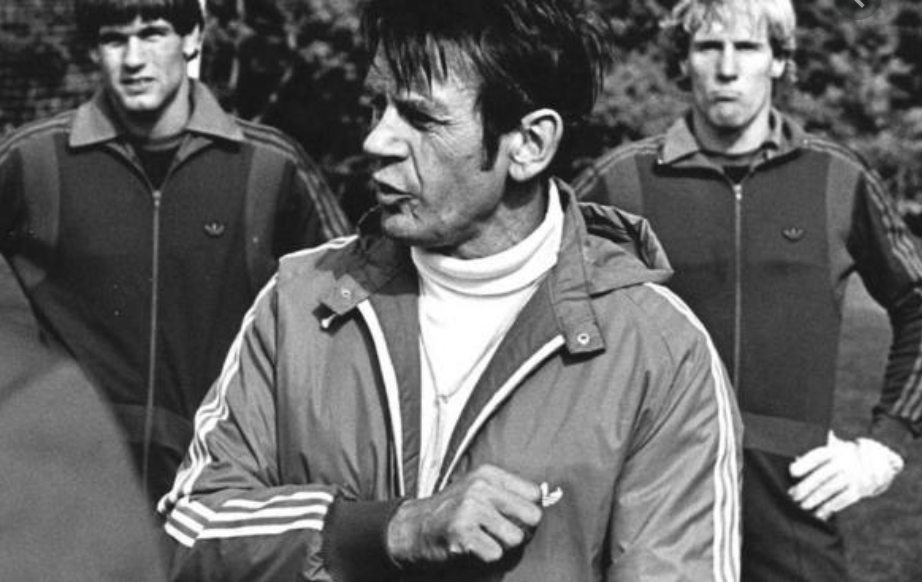
Oranje disappoints and after win vs Greece and a loss v West Germany Holland draws against the Czechs. And Holland was out. Zwartkruis did have some decent players to work with but was never able to gel a successful team. He used debutants at this tournament who never were able to perform at the required level and despite names like Krol, Schrijvers, Van de Korput, Haan, Rep, John Metgod and Rene van de Kerkhof, we never really played to our best level.
Zwartkruis was a good developer of talent and probably a great assistant coach. Lacked the charisma needed for the NT job and never able to gel a successful team. Again, a footnote.
Failed tournament attempts 1982, 1984 – Kees Rijvers
Rijvers was a gifted coach. Much loved and very successful at club level at FC Twente and PSV. Rijvers himself was a gifted technician who played in the famous golden trio (with Faas Wilkes and Abe Lenstra, two legends) for the Dutch. He was tactically strong and warm personality, loved by media and players. He took over from Zwartkruis after the latter lost the first two qualification games for the Spain World Cup 1982. Rijvers immediately planned to bring Cruyff back to the NT, which he agreed to do. However, JC was contractually obliged to wear his own brand jersey (Cruyff Sports) while the NT had a contract with Adidas. No deal, therefore. Rijvers also got other veterans back: Krol, Rep, Willy van de Kerkhof and even Johan Neeskens, in an attempt to turn things around. Still, despite this, he would be the man who allowed 9 players from the 1988 winning team to make their debut in the NT: Vanenburg, Kieft, Rijkaard, Gullit, Wouters, Koeman, Van Basten, Erwin Koeman and Adri van Tiggelen. Michel Valke and Rene van der Gijp also made their debuts under Rijvers. Rijvers missed out on the WC1982 due to a 2-0 loss vs France in a key final match. France scored their second goal (Platini) thanks to a misunderstanding between Van Breukelen and Krol. Rijvers also missed the 1984 Euros as a result of the (bought?) win of Spain over Malta, 12-1.
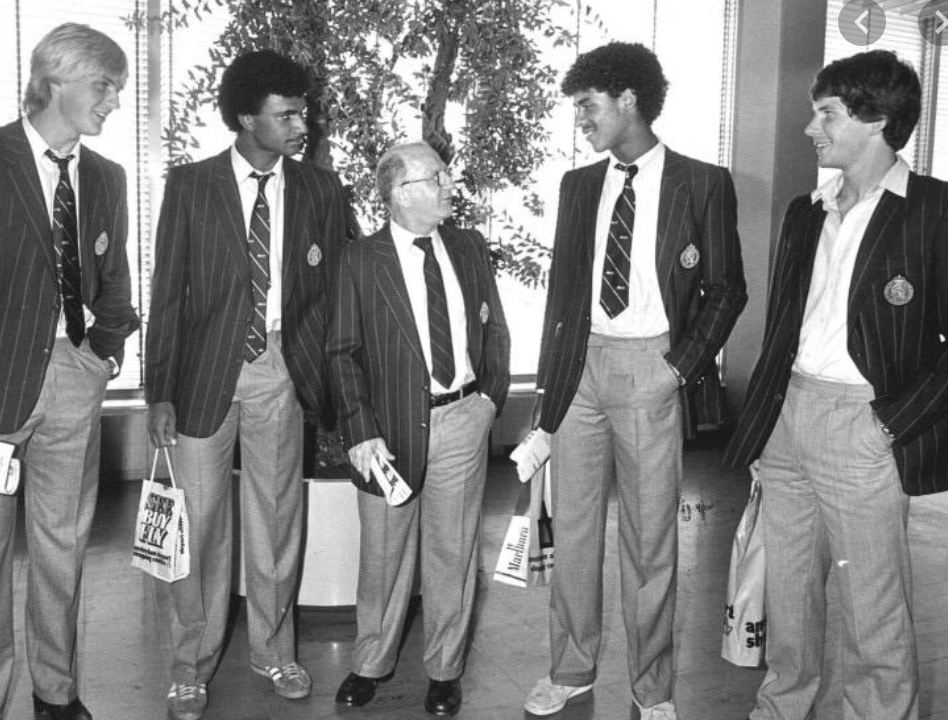
In the qualification round for the 1986 Mexico World Cup, Oranje lost at home vs Hungary. Rijvers resigned after that game, after coaches like Leo Beenhakker lobbied for his firing. Suspiciously, as Beenhakker would get the job soon after…
Despite his strong club career, his playing career and his eye for talent (as aforementioned), not qualifying for two tournaments means he will not be in anyone’s top 5 NT coaches :-).
Failed World Cup 1986 – Leo Beenhakker
After Rijvers’ demise and losing the first match vs Hungary, Rinus Michels took over. He lost his first match too and won his second. Michels had to give way due to health reasons (heart) and his protege Leo Beenhakker – so instrumental in getting Rijvers out – was put in as replacement. Hungary qualified quickly so Holland had to go for second spot which would result in a play-off game. With talented Robbie de Wit – who would see his career ended due to a brain aneurism – in the team, Holland did win against Hungary away, securing a play off match vs Belgium. Oranje lost the first match, 1-0 in Belgium. Wim Kieft was given a red card in the 4th minute, after some play-acting by Vercauteren. The Belgium midfielder would go on and score the winner. The Dutch – playing with Gullit, Rijkaard, Van Basten and De Wit couldn’t get back into it. The home game in Rotterdam was a terrible night for yours truly. It was super cold and my dad injured his knee during the walk to the stadium which would bother him for the rest of his life. We needed to win 2-0 to go to the World Cup and after 84 minutes, Oranje had the two goals thanks to Robbie de Wit and Peter Houtman. A defensive error in the 85th minute allowed George Grün to head the ball in, 2-1. End of fairytale for Holland. No World Cup.
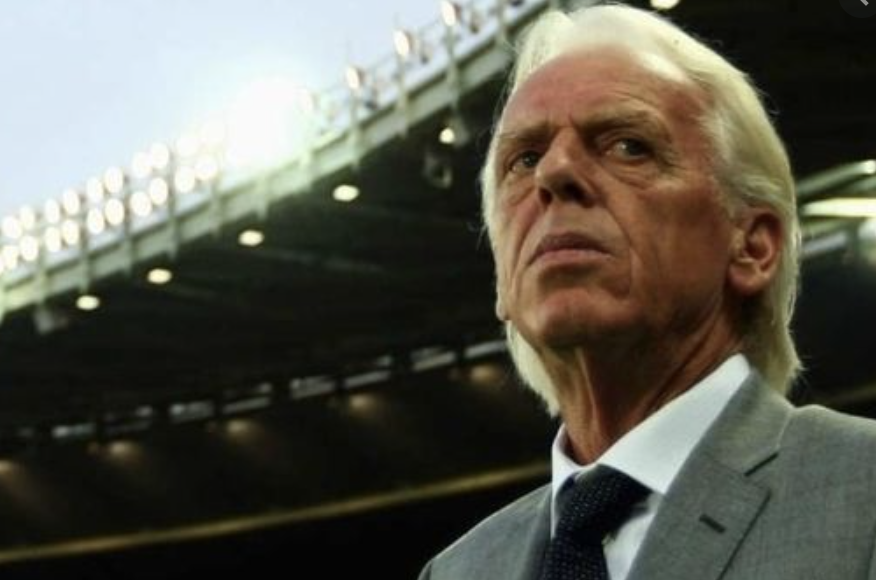
Leo Beenhakker would have another stint in 1990 and wasn’t able to rouse up the troops for a good performance either. The Rotterdam born coach would enjoy successes with Ajax, Real Madrid and Feyenoord among others but was dreadful as team manager. His buffoon type alpha male machoism didn’t go down well with vocal and astute players like Gullit, Rijkaard and Van Basten. A stain on Leo’s career, this NT stuff.
European Championship 1988 – Rinus Michels
The qualifications for the 1988 Euros was not a smooth ride. JC was coach at Ajax, and he would fuel the bad blood between him and Michels by commenting on the team selection and creating a rift between the Ajax and PSV players. The NT lacked unity and the midfield was drastically out of balance. This prompted Michels to bring the experienced Arnold Muhren (35 years old) back to the team to fix it. Despite all this, Holland was too strong for the likes of Poland, Cyprus and Greece and qualified easily. The most talked about event was the bomb-incident, in the match v Cyprus. The Cyprus team walked off the pitch when a fireworks bomb was thrown close to the Cyprus goalie. They’d lose the match 8-0, but that was scratched from the books. Holland can be happy the UEFA didn’t disqualify the team. In the re-match, Holland won 4-0. Bosman’s record of scoring 5 goals in one match was also scratched from the history books.
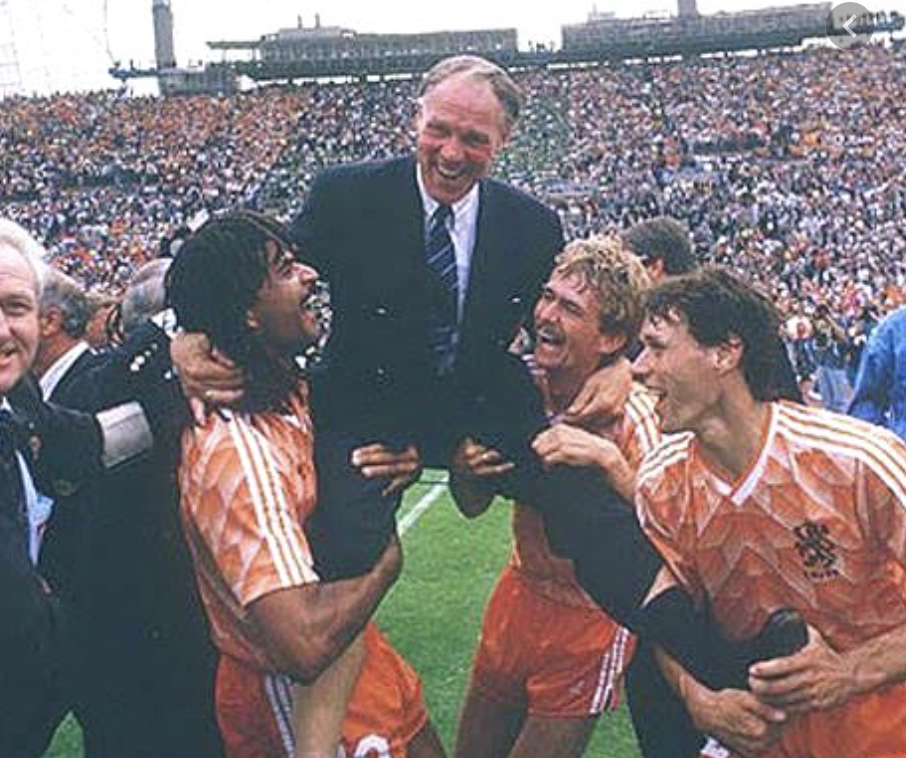
The rest is history. Michels didn’t want to take Van Basten as a main striker, who was injured all season long but fit for the Euros. Van Basten threatened to not come in that case. Cruyff apparently talked Marco into going and he would become the tournament’s star. Michels started with a 4-3-3 but after losing the first match, reverted back to a 4-4-2. Ironically, Oranje’s first and only big trophy was won with a 4-4-2 system…
Michels’ finest moment as Dutch NT coach. He did perform well, was warm towards the players and media and seemed to have found his place and tone of voice. Sadly, in the years to come, he would show his colours again. Still, winning a trophy means you do end up in the top 5 of best Dutch NT coaches…
World Cup 1990 – Thijs Libregts / Leo Beenhakker.
So much has been written about this. One more time, now in Telegram style. Libregts won the title with Feyenoord with Cruyff in 1984 and moved to Greece to coach Aris, PAOK and Olympiakos. He returned as NT manager but had a massive falling out with Gullit, amongst other things for some racial abuse. The players demanded his resignation and the FA – led by Michels – promised the players to recruit Cruyff as coach. Once the dust settled, the players were flabbergasted to see Beenhakker as their new coach, and not the famous #14.
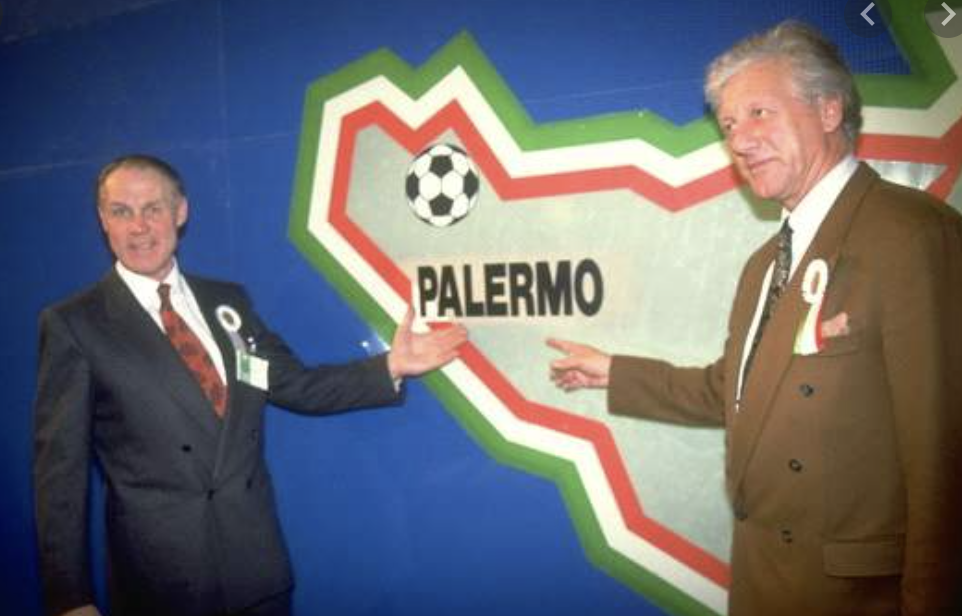
The rest we know. A dreadful preparation phase, in some dreary Yugoslavian castle. Bad vibe in the squad. Gullit in particular not fit. Tired of football. And more. Beenhakker had battle after battle and even showed up at a press conference with a black eye, explaining he hit his head. Some people claim Van Basten threw an ashtray to his face. We’ll never know. After the WC, Beenhakker quipped that 75% of all that happened during that campaign has never came out. He promised to share it one day, but he never has, so far. An abysmal World Cup, with what was considered one of the best squads the Oranje ever had.
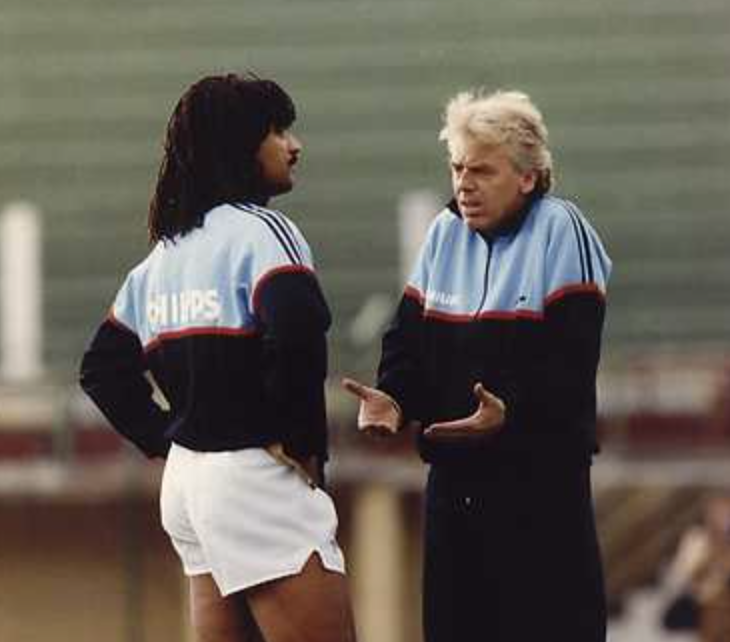
I have never been a Leo Beenhakker fan. An arrogant coach, with an inflated ego. He has never had any loyalty. Escaped to bigger clubs any time he got the chance.
European Championships – Rinus Michels
Rinus decided to put his hand up to fix the Oranje problems. Frank Rijkaard immediately retired from international football. Koeman was suspended by Michels for criticising his tactics and John Van’t Schip was suspended because he preferred to witness the birth of his first child, and arrived later at the trainings camp. Michels did bring Frank de Boer and Dennis Bergkamp in the mix. Holland did qualify relatively easy, but was not without little scandals, as Wim Kieft left the camp one day, when he was treated disrespectfully by Bryan Roy, who called him “tall tree”. Gullit and Michels clashed repeatedly as the latter accused Gullit of being to injury prone and too happy to let games go.
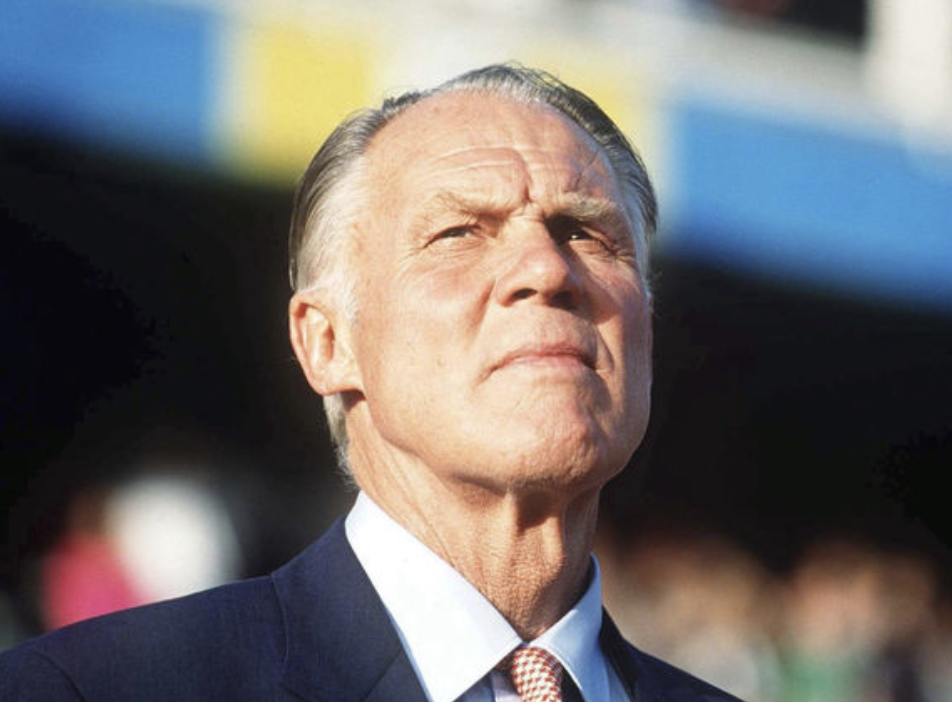
The Tournament in Sweden would become the tournament of the holidaying Danes, who were called up as replacement for Yugoslavia. Michels’ team didn’t impress vs Scotland, although we got the win (1-0) thanks to a late Bergkamp goal. We drew vs the GOS (Russia) but beat Germany 3-1 in a great match. The knock out stages ended with the Danes having the better of us in a penalty shoot out, with Van Basten missing vs Schmeichel.
Not a bad result, but not sure how much Rinus and his assistant mini-general Dick Advocaat had to do with that. Gullit was unstoppable at times. Van Basten was instrumental without scoring and Dennis Bergkamp presented himself at the highest level. We could have gone all the way I think but again, not sure how much praise Michels deserved. I think the players wanted to set the score right after the dreadful WC1990.
World Cup 1994 – Dick Advocaat
The mini-general was always Michels’ choice. The players wanted JC again and they actually went over to see him at Barca and negotiate a deal. The deal imploded on Cruyff’s demand to pick his own assistants. The Federation, in those days, had their own coaches and insisted Johan would use them. Cruyff did not have a lot of respect for these cats and felt he wasn’t going to go anywhere without his trusted scout (Tonnie Bruins-Slot) and assistants. So it was a no go. Advocaat is known for his “un-Dutch” cautious defensive game. Sure, he did great as a club coach, but he lacked the adventurous streak we so desire and he didn’t seem too switched on with the circumstances. Gullit was aware there would be a heatwave in Florida and tried to convince Dickie to play a tactics that would work for the best players (read: Gullit and Rijkaard). Van Basten was already ruled out, basically. Advocaat belittled Gullit and the latter decided to not go.
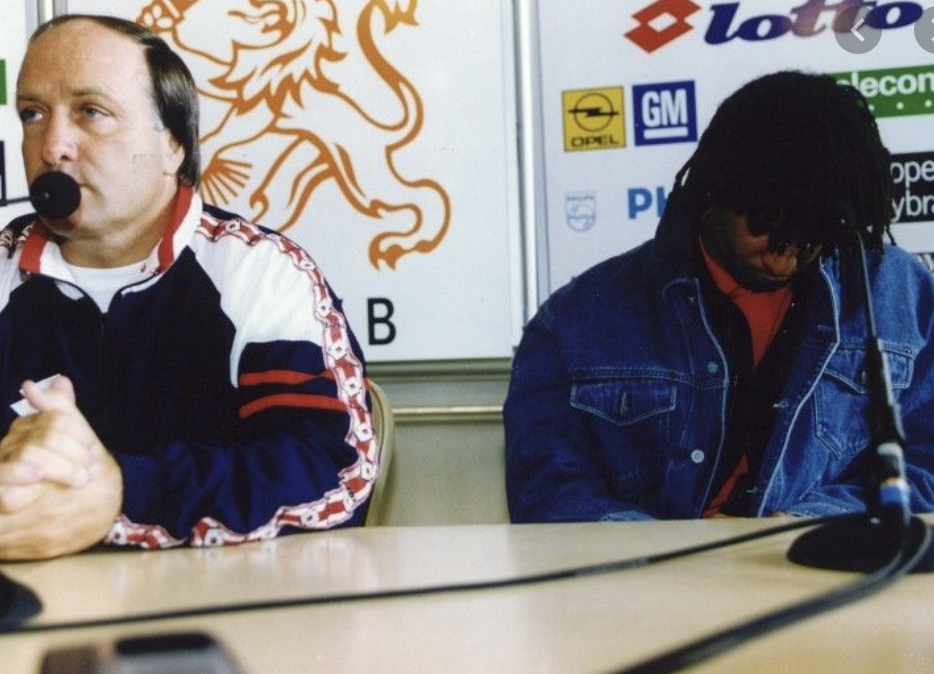
Advocaat got his team to the quarter finals were Brazil was too strong. Upon his return to Holland, Advocaat said that being amongst the best 8 teams in the world was a great result. The fans felt that it wasn’t. A great result would be a semi final spot. This was ok. We beat Morocco, Ireland and Saudi Arabia. Big deal.
Advocaat would get a second spell. Overall, a mediocre performance on both counts.
European Championships 1996 – Guus Hiddink
Poor Guus inherited the salary rift that was going around at Ajax. Some home grown talents didn’t make as much as some of the new signings and some of the white players were allegedly making more than the dark players. Hiddink didn’t get the problems ironed out. He also humiliated Seedorf by subbing him off against Switzerland after 26 minutes while Davids only got 10 minutes in that game. Hiddink tended to talk tactics with De Boer and Blind and neglect Davids and Seedorf – according to them – and Edgar let fly in an interview, saying Hiddink should take his head out of De Boer’s arse. Poetic. Davids was sent home and the tournament ended with a penalty shoot out, lost, vs France.
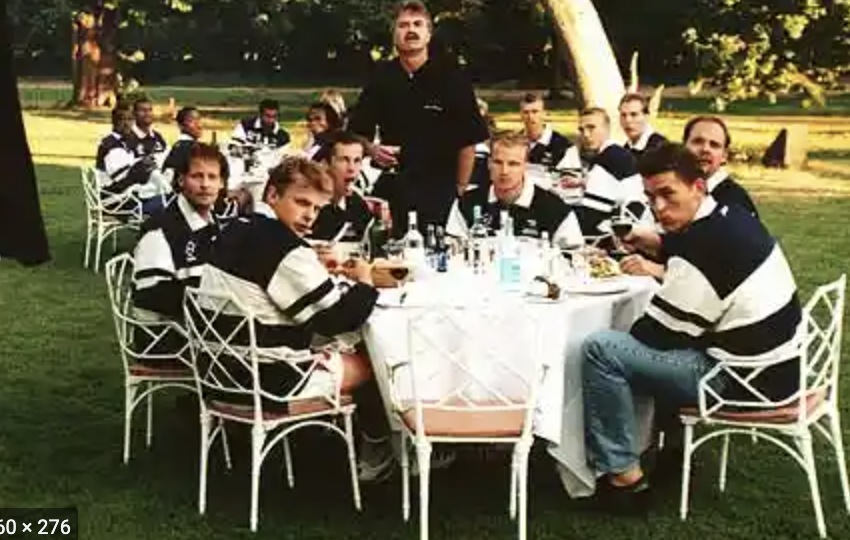
A tough tournament to judge Guus on. Overall a comedy of errors and a humiliation by England. Kluivert’s conciliation goal got us through, for a quarter finals vs France.
World Cup 1998 – Guus Hiddink
With the 1974 and 1978 World Cups, this is one that we could have and should have won. With one of the strongest squads (Davids was taken back in by Hiddink and played a top notch tournament), we reached the semis. The quarter finals vs Argentina is a high light in Oranje’s history, with Frank de Boer’s long range pass and Bergkamp’s outside foot winner, in the last minutes of the game! The key question still is: did Oranje deserve a penalty late in the semi finals against Brazil, when Pierre van Hooijdonk was pulled to the ground? We all think YES.
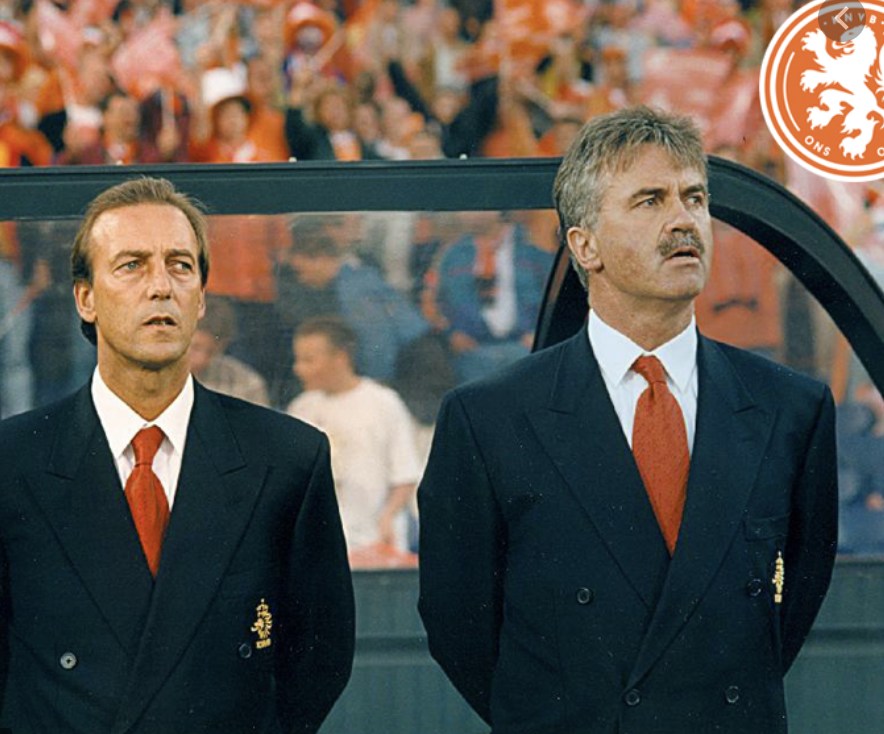
This was Guus’ golden tournament which catapulted him to the level of top coach on the planet. Real Madrid, Australia, South Korea, they’d all follow. Included a not so successful stint only recently… This tournament justifies a spot in the top 5 of best NT coaches ever, for Oranje.
This is it for now. The coaches from 2000 until now, in the next post!
My top 3 NT coaches from 1974 till 1998, shouldn’t be a big surprise:
- Rinus Michels – 1974
- Ernst Happel – 1978
- Guus Hiddink – 1998
Gimme your views below!

